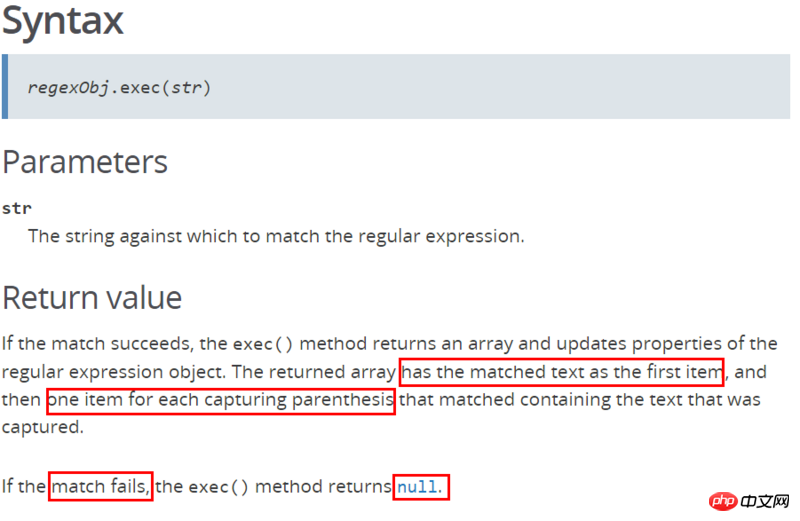See that the following function is used to obtain the value of the url.
function getURLParameter(name) {
return decodeURI(
(RegExp(name + '=' + '(.+?)(&|$)').exec(location.search)||[,null])[1]
);
}But I don’t know what expression [,null] is here.
怪我咯2017-06-26 11:00:11
The purpose of this function is to get the value of a certain parameter in the URI, such as the URL http://www.xxx.com/index.html?key=hello&value=world*. At this time, location.search is equal to ?key=hello&value=world. For example, to get the value of key ("hello"), just call getURLParameter("key").
The syntax of exec is as follows:

If it matches, the return result is an array. The first element of the array is the matched substring, and the subsequent elements are the contents of the capturing brackets. As can be seen from the regular expression, the result we need is the th The content of a capturing bracket is the second element of the array, so [1];
For example, assuming the URL is still the one above, we call getURLParameter("key"), and the matching result is ["key=hello&", "hello", "&"], "key=hello& " is the matched substring, "hello" is the content of the first capturing bracket, "&" is the content of the second capturing bracket. ["key=hello&", "hello", "&"] || [,null]The result is of course the previous item, which is ["key=hello&", "hello", "&"] , then take [1], and the return value of the entire function is "hello".
However, if we call getURLParameter("time"), the matching fails, so the result is null. At this time, if you call [1], an error will be reported. [,null] means [undefined, null]. When the matching fails, it becomes null || [undefined, null]. This result is [undefined, null]. At this time, [1]No error will be reported. At this time, the entire function returns null.
After calling the getURLParameter function, you can determine whether the return value is null. If it is null, it means there is no such parameter in the URL; if it is not null, the return value is the required parameter value.
代言2017-06-26 11:00:11
Lazy approach, (name + '=' + '(.+?)(&|$)').exec(location.search)If the match is successful. The result will not be null. (.+?) is the regular matching value [1]. If the match fails, exec returns null. [,null]The first value is undefined. This operation only unifies the return value to null. The key is that the last [1] causes
If the latter one is [0], then [,null] can be rewritten as [null]
阿神2017-06-26 11:00:11
[,null][1] Isn’t it null? If the previous one is not matched, null will be returned
扔个三星炸死你2017-06-26 11:00:11
It’s equivalent to this
return decodeURI(
( RegExp(name + '=' + '(.+?)(&|$)').exec(location.search) )[1] || null
);
But if the parameter value is not obtained in the previous section (RegExp(name + '=' + '(.+?)(&|$)').exec(location.search) ), an error will be reported if [1] is taken directly. So adding [,null] at the end is equivalent to [undefined, null], and taking [1] at the end can ensure that array out-of-bounds errors will not occur because the url parameters cannot be obtained